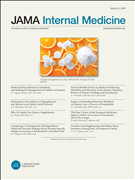JAMA Intern Med:LABA或可增加COPD患者心血管风险
2013-05-28 JAMA Inter Med CMT 青楚
加拿大学者的一项研究表明,慢性阻塞性肺疾病(COPD)患者使用长效β受体激动剂(LABA)和长效抗胆碱能药物与心血管事件风险升高相关,且两种药物之间没有显著差异。论文2013年5月20日在线发表于《美国医学会杂志·内科学》(JAMA Internal Medicine)。 该研究通过医疗保健数据库纳入接受5年以上COPD治疗的66岁以上患者191005例
加拿大学者的一项研究表明,慢性阻塞性肺疾病(COPD)患者使用长效β受体激动剂(LABA)和长效抗胆碱能药物与心血管事件风险升高相关,且两种药物之间没有显著差异。论文2013年5月20日在线发表于《美国医学会杂志·内科学》(JAMA Internal Medicine)。
该研究通过医疗保健数据库纳入接受5年以上COPD治疗的66岁以上患者191005例。其中53,532例(28%)患者因急性冠脉综合征(ACS)、心衰、缺血性卒中或心律失常而急诊入院。对所有COPD患者与非COPD患者进行匹配后加以分析。
结果显示,患者在使用LABA和长效抗胆碱能药物后2-3周内发生心血管事件风险最高,且药物之间无显著差异。首次使用LABA和长效抗胆碱能药物的患者与没有使用此类药物的患者相比,心血管事件风险更高。对心血管终点进行单独评估时,ACS和心衰风险升高,但心律失常和卒中并非如此。实际上,长效抗胆碱能药物对缺血性卒中有保护作用,LABA则无此效应。
多位相关专家评论该研究时表示,由于LABA和长效抗胆碱能药物均为COPD的主要治疗药物,并且无其他药物可延缓疾病进展,因此需对应用长效支气管扩张剂的患者进行密切监测。
长效支气管扩张剂与心血管事件之间的关系在POET-COPD随机对照研究以及之前的一项小型研究得到证实,正在进行的TIOSPIR安全性研究或许可解释不同COPD治疗药物的相对风险。

Importance
Chronic obstructive pulmonary disease (COPD) is a common and deadly disease. Long-acting inhaled β-agonists and anticholinergics, first-line medications for COPD, have been associated with increased risk of cardiovascular outcomes. When choosing between the medications, patients and physicians would benefit from knowing which has the least risk.
Objective
To assess the association of these classes of medications with the risk of hospitalizations and emergency department visits for cardiovascular events.
Design
We conducted a nested case-control analysis of a retrospective cohort study. We compared the risk of events between patients newly prescribed inhaled long-acting β-agonists and anticholinergics, after matching and adjusting for prognostic factors.
Setting
Health care databases from Ontario, the largest province of Canada, with a multicultural population of approximately 13 million.
Participants
All individuals 66 years or older meeting a validated case definition of COPD, based on health administrative data, and treated for COPD from September 1, 2003, through March 31, 2009.
Exposure
New use of an inhaled long-acting β-agonist or long-acting anticholinergic.
Main Outcome and Measures
An emergency department visit or a hospitalization for a cardiovascular event.
Results
Of 191 005 eligible patients, 53 532 (28.0%) had a hospitalization or an emergency department visit for a cardiovascular event. Newly prescribed long-acting inhaled β-agonists and anticholinergics were associated with a higher risk of an event compared with nonuse of those medications (respective adjusted odds ratios, 1.31 [95% CI, 1.12-1.52; P < .001] and 1.14 [1.01-1.28; P = .03]). We found no significant difference in events between the 2 medications (adjusted odds ratio of long-acting inhaled β-agonists compared with anticholinergics, 1.15 [95% CI, 0.95-1.38; P = .16]).
Conclusions and Relevance
Among older individuals with COPD, new use of long-acting β-agonists and anticholinergics is associated with similar increased risks of cardiovascular events. Close monitoring of COPD patients requiring long-acting bronchodilators is needed regardless of drug class.
本网站所有内容来源注明为“梅斯医学”或“MedSci原创”的文字、图片和音视频资料,版权均属于梅斯医学所有。非经授权,任何媒体、网站或个人不得转载,授权转载时须注明来源为“梅斯医学”。其它来源的文章系转载文章,或“梅斯号”自媒体发布的文章,仅系出于传递更多信息之目的,本站仅负责审核内容合规,其内容不代表本站立场,本站不负责内容的准确性和版权。如果存在侵权、或不希望被转载的媒体或个人可与我们联系,我们将立即进行删除处理。
在此留言








#LABA#
58
#血管风险#
59
#COPD患者#
53
#Med#
47